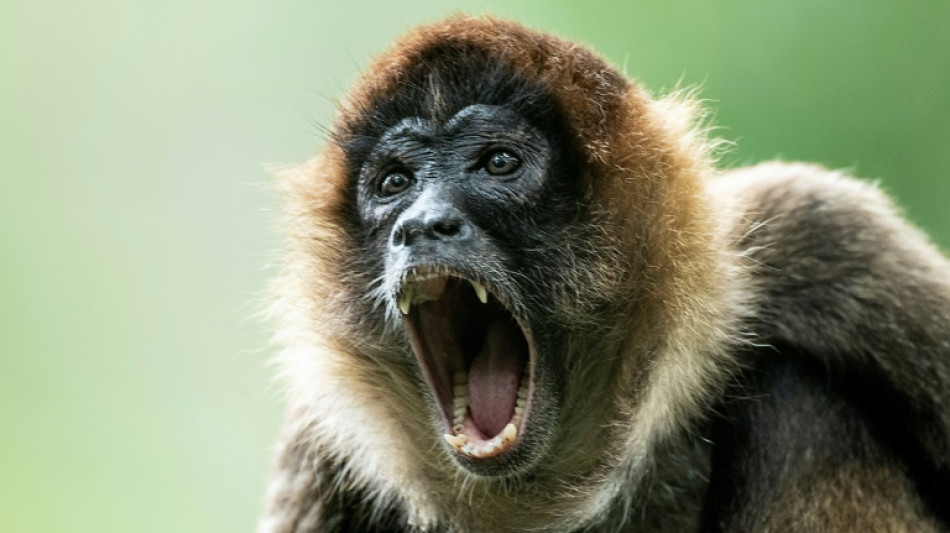
-
 Earl says England inspired by last year's Calcutta Cup
Earl says England inspired by last year's Calcutta Cup
-
USA romp past Dutch in T20 World Cup to keep Super Eight hopes alive

-
 De Minaur scraps past local legend van de Zandschulp
De Minaur scraps past local legend van de Zandschulp
-
Ukrainian Heraskevych loses appeal against Olympics disqualification

-
 Ghana rallies round traditional tunic after foreign mockery
Ghana rallies round traditional tunic after foreign mockery
-
Forest set to hire former Wolves boss Pereira: reports

-
 England rugby captain Itoje slams Ratcliffe's 'ridiculous' immigration comments
England rugby captain Itoje slams Ratcliffe's 'ridiculous' immigration comments
-
Europe should speak to Russia with 'one voice', Putin foe says

-
 US Congress impasse over immigration set to trigger partial shutdown
US Congress impasse over immigration set to trigger partial shutdown
-
US to deploy new aircraft carrier to Middle East as Trump warns Iran

-
 Ubisoft targets new decade of 'Rainbow 6' with China expansion
Ubisoft targets new decade of 'Rainbow 6' with China expansion
-
Stocks trend lower as AI disruption worries move to fore

-
 Spurs set to hire Tudor as interim boss until end of season: reports
Spurs set to hire Tudor as interim boss until end of season: reports
-
International crew en route to space station

-
 Man City's Rodri charged over ref rant
Man City's Rodri charged over ref rant
-
Italian biathlete Passler cleared to compete at Olympics despite positive test

-
 Macron slams 'antisemitic hydra' as he honours 2006 Jewish murder victim
Macron slams 'antisemitic hydra' as he honours 2006 Jewish murder victim
-
Tuipulotu warns England to beware 'desperate' Scotland in Six Nations

-
 Cash-starved French hospitals ask public to pitch in
Cash-starved French hospitals ask public to pitch in
-
US consumer inflation eases more than expected to lowest since May

-
 Germany's Merz urges US to repair ties with Europe
Germany's Merz urges US to repair ties with Europe
-
Europe seeks new 'partnership' with US at security gathering

-
 Fresh water leak adds to Louvre museum woes
Fresh water leak adds to Louvre museum woes
-
Floods wreak havoc in Morocco farmlands after severe drought

-
 Russia, Ukraine to hold talks in Geneva on February 17-18
Russia, Ukraine to hold talks in Geneva on February 17-18
-
Ukraine's Heraskevych hopes 'truth will prevail' in Olympics appeal

-
 Dumplings and work stress as Chinese rush home for Lunar New Year
Dumplings and work stress as Chinese rush home for Lunar New Year
-
Macron denounces 'antisemitic hydra' as he honours 2006 Jewish murder victim

-
 India-Pakistan: Hottest ticket in cricket sparks T20 World Cup fever
India-Pakistan: Hottest ticket in cricket sparks T20 World Cup fever
-
Cross-country king Klaebo equals Winter Olympics record with eighth gold

-
 Ukraine's Heraskevych appeals to CAS over Olympic ban as Malinin eyes second gold
Ukraine's Heraskevych appeals to CAS over Olympic ban as Malinin eyes second gold
-
Stocks mostly drop after Wall Street slide

-
 Sophie Adenot, the second French woman to fly to space
Sophie Adenot, the second French woman to fly to space
-
Alleged rape victim of Norway princess's son says she took sleeping pills

-
 Activist group Palestine Action wins legal challenge against UK ban
Activist group Palestine Action wins legal challenge against UK ban
-
Driven by Dhoni, Pakistan's X-factor tweaker Tariq targets India

-
 Davidson set to make history as Ireland seek to rebound against Italy
Davidson set to make history as Ireland seek to rebound against Italy
-
Europe defends NATO, US ties at security gathering

-
 China's fireworks heartland faces fizzling Lunar New Year sales
China's fireworks heartland faces fizzling Lunar New Year sales
-
Bangladesh's Yunus 'banker to the poor', pushing democratic reform

-
 Cracknell given Six Nations debut as Wales make changes for France
Cracknell given Six Nations debut as Wales make changes for France
-
L'Oreal shares sink as sales miss forecasts

-
 Bangladesh nationalists celebrate landslide win, Islamists cry foul
Bangladesh nationalists celebrate landslide win, Islamists cry foul
-
Thai PM agrees coalition with Thaksin-backed party

-
 Zimbabwe pull off shock win over Australia at T20 World Cup
Zimbabwe pull off shock win over Australia at T20 World Cup
-
Merz, Macron to address first day of Munich security meet

-
 Three dead, many without power after storm lashes France and Spain
Three dead, many without power after storm lashes France and Spain
-
Bennett half-century as Zimbabwe make 169-2 against Australia

-
 Asian stocks track Wall St down as traders rethink tech bets
Asian stocks track Wall St down as traders rethink tech bets
-
'Weak by design' African Union gathers for summit


Revealed: Why monkeys are better at yodelling than humans
Yodellers of the world, you never stood a chance: Monkeys will always be better at yodelling than humans because they have a "cheap trick" hidden in their voice box, scientists revealed Thursday.
When monkeys howl -- or yodellers yodel -- they rapidly switch back and forth between low and high frequency sounds.
This is in contrast to opera singers, who are trained to precisely control how they gradually move from note to note, in a way that is pleasing to listen to.
Yodellers and monkeys, however, make bigger jumps far more abruptly, creating vocal breaks that sound like Tarzan's yell.
When yodelling, a human might be able to jump an octave, which doubles the frequency.
Monkeys can manage three and half octaves, according to a new study.
A "cheap trick" in their larynx means these monkeys will always beat humans, senior study author Jacob Dunn of the UK's Anglia Ruskin University told AFP.
Both humans and monkeys have a pair of vocal folds in their larynx which vibrate to create sound.
But monkeys have an additional pair of membranes that gives them a far wider pitch range, the international team of researchers discovered.
This is thought to give monkeys, which are social creatures, a more complex way of communicating with each other.
All other primates, and even ancient human ancestors, appear to have this special tissue, Dunn said.
At some during our evolution, humans seem to have lost these membranes, he added.
But the shame of being inferior yodellers may have been worth the trade-off.
To be able to speak clearly, humans needed a "streamlined" larynx -- and these membranes would have gotten in the way, Dunn explained.
"If you put a human brain on the primate larynx" it would struggle to speak intelligibly because of the membranes and other things like air sacs, he said.
For the study, the researchers put sensors on the necks of some monkeys at Bolivia's La Senda Verde Wildlife Sanctuary.
This allowed them to see what was going on in the larynx of black and gold howler monkeys, tufted capuchins, black-capped squirrel monkeys and Peruvian spider monkeys.
The spider monkey was the best yodeller, managing around four octaves, Dunn said.
The researchers also studied the larynges of dead monkeys and used computer modelling to analyse the frequencies.
The study was published in the journal Philosophical Transactions of the Royal Society B.
L.Miller--AMWN

